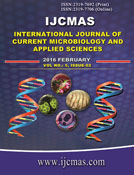


 National Academy of Agricultural Sciences (NAAS)
National Academy of Agricultural Sciences (NAAS)

|
PRINT ISSN : 2319-7692
Online ISSN : 2319-7706 Issues : 12 per year Publisher : Excellent Publishers Email : editorijcmas@gmail.com / submit@ijcmas.com Editor-in-chief: Dr.M.Prakash Index Copernicus ICV 2018: 95.39 NAAS RATING 2020: 5.38 |
This study was conducted in Northeastern part of Jeddah city. Calotropis procera plant was used as bioindicator and phytoremediator of contamination with heavy metals arising from the cement factory located in this area. Three study sites were chosen, the first site (control) where C. procera plants growing 4.88 km far away from the polluted area (the cement factory) and the other sites at the cement factory has also been divided into two sites the first one include C. procera plants growing around the factory (location 2), the second site include C. procera plants growing 150 meters far away from the factory (location 1). Samples of plants and soils were collected during summer and winter seasons (2013-2014) for laboratory works. Amount of some heavy elements (Aluminum, Chromium, Boron, Barium, Copper, Manganese, Iron, Lead and Zinc), were estimated, in plants and soil. Results revealed that, C. procera has the ability to have reasonable amount of heavy elements at normal ranges. Worth mentioning is that soil heavy elements were less than in plants, indicating the phytoremediation ability of this plant in cleaning the soil, meaning that, this plant absorbs the pollutants from the atmosphere. It is noticeable that heavy elements accumulated more during winter season in plants and during summer season in soil. Therefore, C. procera can be used as protective belts near polluted areas in Jeddah.
 |
 |
 |
 |
 |